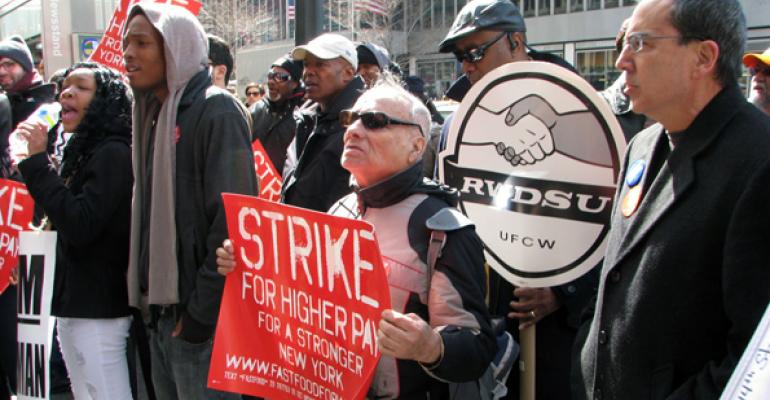Labor organizers are calling for quick-service workers across the country to stage a day of strikes on Aug. 29, what could be the largest event in an ongoing campaign to pressure restaurant chains to raise wages.
Low-wage workers have organized one-day job walkouts in various cities across the country this summer, such as New York, Washington, D.C., St. Louis, Milwaukee and Detroit.
The event planned for Aug. 29, however — timed to commemorate the 50th anniversary of the March on Washington for Jobs and Freedom — will be the first national effort in the campaign, and organizers are predicting that it will be the largest strike in quick-service history, impacting dozens of cities in all regions of the U.S.
RELATED
• New York quick-service workers strike again
• Protestors rally at McDonald's, Wendy's shareholder meetings
• More quick-service restaurant news
Next week’s strike will target the entire quick-service industry, including McDonald’s, Wendy’s, Burger King, Taco Bell, KFC, Pizza Hut, Domino’s, Little Caesar’s, Subway, Jack in the Box, Jimmy John’s, and more, according to a spokesman for the unidentified group behind the website LowPayIsNotOK.org, which is promoting the event. He asked for his identity to remain anonymous.
At issue is the argument that the median wage of about $8.94 an hour puts most workers below the poverty line. Workers are calling for a pay increase to $15 an hour and the right to form a union.
Rather than focus on the wage issue, chains such as Domino’s and McDonald’s, as well as officials at Burger King, have noted the career path offered to all in the industry, even those who start out at the lowest pay levels.
In a statement that was not attributed to a spokesperson, McDonald’s USA said the Oak Brook, Ill.-based burger giant aims to offer competitive pay and benefits, providing training and professional development for all who wish to take advantage of such opportunities. “Our history is full of examples of individuals who worked their first job with McDonald’s and went on to successful careers both within and outside McDonald’s,” the statement said.
Tim McIntyre, vice president of communications at Ann Arbor, Mich.-based Domino’s, said 90 percent of U.S. franchisees started as delivery drivers or at in-store positions. “We are a company of opportunity,” he said. “In addition to our store owners, most of our managers, supervisors, franchise consultants, trainers, operations auditors, even some of our executives, started in the stores,” he said.
Additionally, pizza delivery staffers earn a combination of wages and tips, allowing them to make more than the minimum wage. And, for many, work at Domino’s is a second job they can do at night and on weekends, supplementing a traditional day job or school, McIntyre said.
Miami-based Burger King Corp. said the almost-all franchised burger chain has also served as a workforce entry point for millions of Americans, and that restaurant compensation and benefits are consistent with the QSR industry.
“In addition, through the Burger King McLamore Foundation, all Burger King employees and their families are eligible for college scholarships to encourage further growth and education,” Burger King said in a statement from the media relations team.
John Gordon, principal of San Diego-based Pacific Management Consulting Group, said the industry has a strong argument for offering opportunity — noting that he also got his start in high school working at the now-defunct Burger Chef chain in 1973.
Still, he said, “They may be off base in arguing that everyone can advance up. Only a few can. Practically speaking, the cream always rises to the top, but that’s a harsh message.”
At the same time, Gordon said a $15 wage in the restaurant industry is unsustainable and would roughly double the average hourly restaurant wage rate in the country — an increase that would be very difficult for the franchise operators that dominate the space to take on, given their small profit margins.
“Progress has to be slower and more gradual over time,” he said.
Depending on how workers respond to the call for a national strike next week, a larger number of restaurants and brands could be impacted, Gordon said.
“When a restaurant loses a sale, about 50 cents of that drops to the bottom line,” he said.
Contact Lisa Jennings at [email protected].
Follow her on Twitter: @livetodineout




